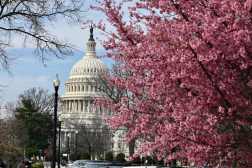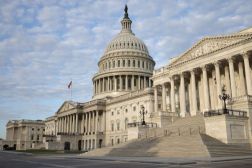Tech fellows provide value for members of Congress — but is it enough?

Mark Zuckerberg’s April appearances before Congress provided those who don’t often watch hearings with a rude awakening as to the (lack of) tech savvy among many on Capitol Hill. Stories were written; memes were made.
But for TechCongress, a year-long fellowship that places technologists in the offices of members of Congress, the spectacle was also an opportunity — a rare moment when wide public consciousness was focused on the need for more tech expertise on the Hill.
Now, TechCongress just needs the lawmakers themselves to view in-house tech expertise as a necessity, rather than a luxury.
This is the upshot of an analysis of the impact of the program, conducted by policy expert David Shorr and funded by the Ford Foundation. Shorr interviewed 10 current and former Congressional Innovation Fellows, as well as seven managers, to understand how successful the fellows have been in contributing to office policy.
The results are heartening — both fellows and their managers seem to view the experience as valuable. Fellows can get up-and-running pretty quickly (though a general understanding of policy does help) and start writing letters, attending in-office meetings or commissioning studies as ways to influence policymaking.
The report found that instances of a fellow being underutilized weren’t “a serious problem” — it acknowledged that tech isn’t just about tech. “The challenge of better policies on emerging technologies is widely appreciated as spanning all areas of policy,” the report reads. “More than half of the fellows and supervisors interviewed expressed some version of ‘tech touches everything.'”
The vehemence with which interviewees believed this surprised Shorr. “It’s not that that is an unusual idea,” he told FedScoop in an interview. “It has the ring of truth to be sure.” But Shorr had expected to find that certain member interest areas or assignments pushed that member’s office to bring in a fellow. Instead, he found broad appreciation for what tech expertise can mean.
This is good news for the future of the fellowship and its goals. Appreciation for in-house tech experts is growing. “My read overall is that I think you can say there is a dawning awareness of how important this perspective is,” Shorr said. “You can see that awareness growing — though it’s hard to say how fast it is growing.”
On the other hand, a perennial initiative to bring back the Office of Technology Assessment — which provided members of Congress with reports on tech and science issues until it was shut down in 1995 — failed once again this summer.
Travis Moore, the founder of TechCongress, told FedScoop that the study helped solidify some things he and his team knew intuitively already. “The Zuckerberg hearings were a game changer,” he said. And moving forward, as the program grows, “we shouldn’t let a good crisis go to waste.”
The results also helped to direct some changes he’ll make with future cohorts — including a very early focus on placing fellows where they will have the best chance of success, and doubling down on the already-existing policy skills trainings.
In its three years of operation, TechCongress has hosted 13 fellows. Two former fellows have gone on to stay as permanent staff in an office — the ultimate demonstration of success for the program. TechCongress is currently recruiting for its fourth cohort.
Another organization — a Democratic political action committee called 314 Action — wants to take the issue on from the top-down, working to bring more tech-savvy lawmakers into Congress.






